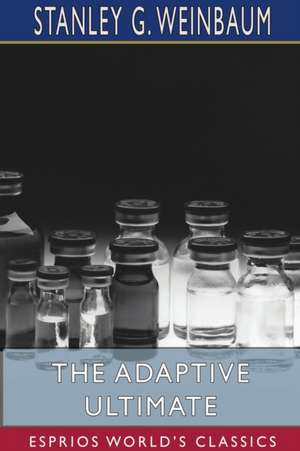The Adaptive Ultimate (Esprios Classics)
Autor Stanley G. Weinbaumen Limba Engleză Paperback – 21 dec 2021
Preț: 107.80 lei
Nou
Puncte Express: 162
Preț estimativ în valută:
20.63€ • 21.31$ • 17.17£
20.63€ • 21.31$ • 17.17£
Carte disponibilă
Livrare economică 05-19 martie
Preluare comenzi: 021 569.72.76
Specificații
ISBN-13: 9781715840297
ISBN-10: 1715840291
Pagini: 44
Dimensiuni: 152 x 229 x 3 mm
Greutate: 0.08 kg
Editura: Blurb
ISBN-10: 1715840291
Pagini: 44
Dimensiuni: 152 x 229 x 3 mm
Greutate: 0.08 kg
Editura: Blurb
Notă biografică
Stanley Grauman Weinbaum (1902 - 1935) was an American science fiction writer. His first story, "A Martian Odyssey", was published to great acclaim in July 1934, but he died from lung cancer less than a year and a half later. He is best known for the groundbreaking science fiction short story, "A Martian Odyssey", which presented a sympathetic but decidedly non-human alien, Tweel. Even more remarkably, this was his first science fiction story (in 1933 he had sold a romantic novel, The Lady Dances, to King Features Syndicate, which serialized the story in its newspapers in early 1934). Isaac Asimov has described "A Martian Odyssey" as "a perfect Campbellian science fiction story, before John W. Campbell. Indeed, Tweel may be the first creature in science fiction to fulfil Campbell's dictum, 'write me a creature who thinks as well as a man, or better than a man, but not like a man'." Asimov went on to describe it as one of only three stories that changed the way all subsequent ones in the science fiction genre were written. It is the oldest short story (and one of the top vote-getters) selected by the Science Fiction Writers of America for inclusion in The Science Fiction Hall of Fame, Volume One, 1929-1964.
